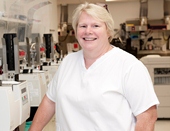
What about being a histotechnologist drew you to the profession?
I look at histotechnology as science and art together. My first job required placing brain sections on slides with a paintbrush and making sure the orientation was correct. This is the kind of science that I like, but also a form of art. I found this combination to be very intriguing.
What physical and/or soft skills do you need to have to succeed?
I find that a type B personality works best. We may get tissue sections that are not adequately fixed or processed and we are required to work with these sections and have patience doing so. Good hand/eye coordination is also beneficial. A histotech may be sitting most of the day when they are embedding or sectioning. Good ergonomics are a benefit. Ergonomics is newly coming into our field and being considered when workstations are set up. There is repetitive motion of the shoulder, wrist, and elbows. We are working on ways to try to lessen repetitive motion injuries.
What interested you in working at Cleveland Clinic?
There is a challenge in working for a world-renowned institution with multiple dynamics of testing. It was a matter of having the opportunity to work with more interesting specimens that you may not see at a community hospital. I like the impact I have on patient care.
What kinds of opportunities are there to keep learning and keep moving forward in the field?
There are many innovations in histotechnology for today and the future. There are the basics: different types of fixations, innovative ways for processing, automated embedders and automated microtomes (to help with repetitive motion), and basic histochemistry (automated special stainers). When I first started the field of immunohistochemistry was just coming into focus. Now we have an entire lab dedicated to immunohistochemistry staining. We also just opened an e-pathology area with two histotechnologist employees. They have to know the slides for artifacts and the stains. The slides are scanned and digitized for visualization off site to expedite diagnosis and this is new.
What other kinds of jobs are out there for histotechnologists?
Histotechnicians have the opportunity to work with vendors selling histology related equipment. These techs know the equipment. It is hard when you have a new vendor representative come in and they do not truly know what they are selling. There are also third-party biomedical companies that have histotechs working with them. These techs also have an advantage when it comes to fixing histology equipment.
What advice would you give to students?
Histotechnology is hands on, so be willing to sit and complete artsy science tasks. Having an art background gives you an eye for embedding sectioning and staining work. I feel a type B personality is conducive to limiting frustrations and working with less than perfect histologic preparations.
Learn More
- Histotechnology programs affiliated with Cleveland Clinic.
- Visit the histotechnologist profile for more about this career path.